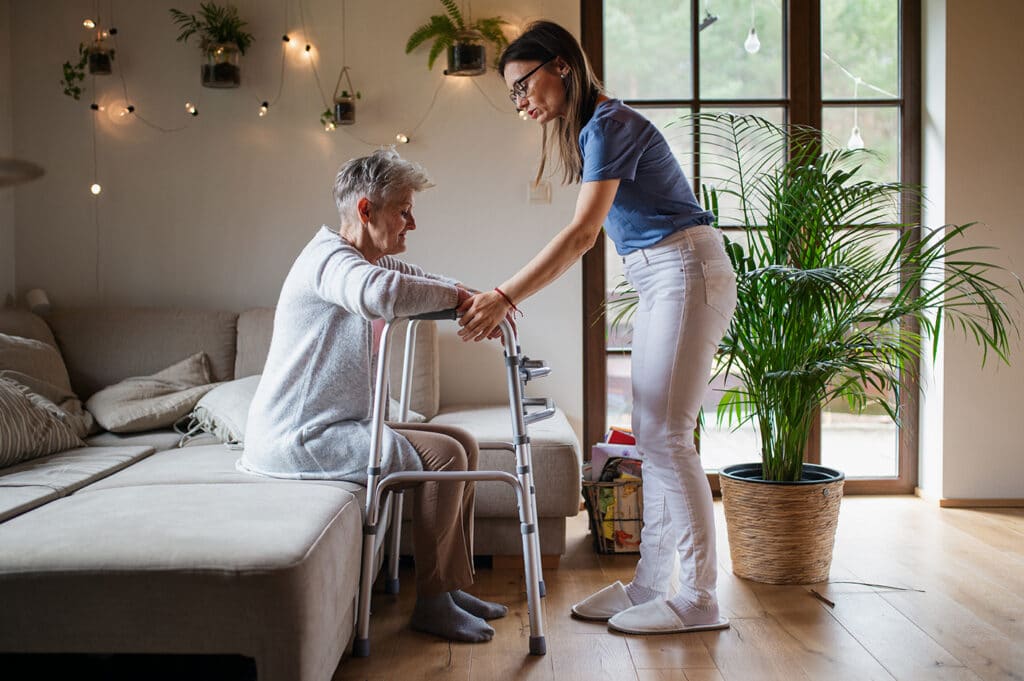It can be difficult to care for a loved one who is terminally or chronically ill. Non-medical home care is also needed to help them with their daily activities. It is important for your loved one to receive hospice care at the end-of-life. However, it is also a smart idea to hire a caregiver to provide non-medical homecare services.
Non-medical homecare services, as the name implies, provide support for aspects of the patient’s daily living that are not covered by traditional hospice care.
Comforts of Home: Seniors, in particular, feel most at home. Research has also shown that people simply feel more comfotable after being hospitalized if they are able to return home, where their surroundings are familiar and where family members are available.
Assistance With Daily Activities: In addition to providing companionship, caregivers can also assist patients with daily activities such as personal care and grooming. Patients with advanced illnesses often find it difficult to perform daily tasks such as dressing, bathing, shaving and dressing. Caregivers can help the patient prepare meals and cook, as well as clean and do laundry.
Medication reminders: While caregivers can’t provide medical care, they are able to remind patients of their medication. Both picking up and helping patients to take their medication on time fall within their responsibilities.
Compassionate care: A caregiver will dedicate their full attention to you and your loved ones. This service is personal and will meet their physical, emotional, and companionship needs.
Hospice is an approach to care, so it is not tied to a specific place. It can be offered in two types of settings — at home or in a facility such as a nursing home, hospital, or even in a separate hospice center.
Hospice care brings together a team of people with special skills — among them nurses, doctors, social workers, spiritual advisors, and trained volunteers. Everyone works together with the person who is dying, the caregiver, and/or the family to provide the medical, emotional, and spiritual support needed.
A member of the hospice team visits regularly, and someone is usually always available by phone — 24 hours a day, seven days a week. Hospice may be covered by Medicare and other insurance companies. Check to see if insurance will cover the person’s particular situation.

Hospice care focuses on the care, comfort, and quality of life of a person with a serious illness who is approaching the end of life.
At some point, it may not be possible to cure a serious illness, or a patient may choose not to undergo certain treatments. Hospice is designed for this situation. The patient beginning hospice care understands that his or her illness is not responding to medical attempts to cure it or to slow the disease’s progress.
You have questions and we have answers, contact us today and one of our Vital Sign Home Care staff members will contact you shortly.

We love hearing what others say about our medical and non-medical home care services. View our testimonials and find out why your family should use our services.
For patients receiving in-home hospice care, the primary caregiver not only provides most of the physical care for the patient, but also helps with keeping records of symptoms and other problems.
The primary caregiver can share the physical care responsibilities with other family members or hired caregivers through Vital Sign Home Care, but takes responsibility for communication with the hospice team, and for scheduling caregivers in the home as needed.
Hospice care staff members are kind and caring. They communicate well, are good listeners, and want to support families during the last stage of an advanced illness. They’re usually specially trained in the unique issues surrounding death and dying and are given ongoing education and support to help with the emotional demands of the job.
It’s important to know that home hospice may require that someone be home with the patient 24 hours a day, 7 days a week. This may be a problem for people who live alone or whose partner or adult children have full-time jobs. But in most cases, creative scheduling and the assistance on a non-medical home care agency like Vital Sign Home Care can help.
Members of the hospice staff will visit regularly to check on the patient, family, and caregivers. They will make sure that any symptoms are under control and give any needed care and services.
Once a patient has accepted hospice care, they will receive routine care aimed at increasing their comfort and quality of life as much as possible. Routine care may include pain management, symptom management, emotional and spiritual counseling for the patient and family, assistance with daily tasks, nutritional services, and therapeutic services.
Routine hospice care can be provided wherever you call home; whether in a skilled nursing facility, assisted living facility, memory care, or your own home. Care will be intermittent based on the patient’s needs.
Home hospice care provides comfort to patients who choose to focus on quality of life rather than cure-oriented care for a terminal illness.
Families of people who received care through a hospice program are more satisfied with end-of-life care than those who did not have hospice services. Also, hospice recipients are more likely to have their pain controlled and less likely to undergo tests or be given medicines they don’t need, compared with people who don’t use hospice care.
Each agency is unique in its own way. At Vital Sign Home Care, we understand how important it is to plan for care that is person-centered, or in other words, focused on the client’s needs first. As soon as we receive an inquiry about our services, we begin our assessment process. This process involves reviewing personal and medical information that is unique to your loved one’s needs.
This process begins with a:
1. Phone Interview
Our admission coordinator will schedule a time to conduct an initial phone interview to gather as much information about your loved one’s needs as well as the family’s needs. Once this information is gathered, we will then schedule an appointment to meet with one of our RN coordinators to begin the next step.
2. Care Plan Meeting
Our care plan meetings are designed to assess your loved one’s home environment and recommend and plan care based on the information provided. After the care plan meeting, a person-centered plan is developed with the family’s permission. No plan is implemented until the family approves the plan.
3. Caregiver Selection
Our RN coordinator along with our admissions coordinators work together to select caregivers based on the needs and interests of the client and family. This process can be tedious but through. We take into consideration various factors to select the proper caregiver for your loved one. Experience as well as personality is taken into consideration during the selection process with a home visit arranged before the final decision is made.
4. Care Monitoring
Caregivers are required to document (care notes) daily about the day-to-day activities as well as the care provided. Care notes remain on-site at the homes. Our RN monitors the caregivers by doing unscheduled visits.
Our person-centered care process allows our RN coordinators to work closely with our admissions coordinators to select caregivers based on the needs and interests of the client and family. Get Started today!